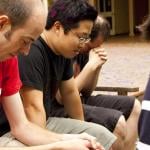By Patrick Mitchel, a friend and professor at Irish Bible Institute in Dublin.
Someone I’m close to recently went through a ‘near death’ experience after major surgery. I’d heard of such experiences but never given them much thought one way or another.
If pushed, I’d probably have given them little weight in terms of authority or reliability. Too much room for wishful thinking, subjective individualistic interpretation and the influence of powerful anaesthetics to put much trust in compared to God’s self-revelation in Scripture – a source of revelation recognised and accepted by Christians of pretty well every hue over the centuries.
And from my limited knowledge, they also tended to be implicitly ‘universalistic’ – in the sense that they often describe quite vague generalities of light and peace that could apply to all sorts of belief systems.
But theology is occasioned by events. It’s a dynamic process of trying to think with a Christian mind about questions life throws up. And so I’m asking what do you think about this near death story and other stories like it? Do you know people who have had such experiences and what has the impact been? How should Christians interpret such experiences?
In ICU after the operation there was a complication and he was not expected to make it through the night. So this was literally a near death experience. When he regained consciousness, he amazed the nurses by having the determination and energy to want to write down for us what he’d seen (he couldn’t talk). He desperately wanted to communicate and nothing was going to stop him.
He wrote ‘I’ve looked into the face of death and of God’. He went on to describe a series of gates, the last one being death. But he did not go through it. There was light and a tremendous sense of the presence and goodness of God. He felt no fear but a peace and certainty that he would be with God rather than enter death. He mentioned people from all over the world being there, of every culture and nation. Things went into reverse. He talked of being given more time.
It’s only a few weeks but I think it’s fair to say that this experience has impacted him at a spiritual and emotional level in a way a lifetime of going to church hasn’t seemed to – in terms of experiencing the goodness of God and of the reality of the hope of life beyond death. He now says he wasn’t prepared for death and people need to know what lies ahead. The experience was very unexpected – all of this is not how he would normally talk of spiritual stuff.
God is no stranger to using dreams and visions to communicate – often in times of crisis. I certainly think that is what is going on here.This experience speaks to me of God’s love and grace, giving hope and revelation of himself at just the right time.
But just as prophecy and tongues need to be assessed, so do dreams and visions. I don’t see here anything contrary to the gospel. There is death as an enemy as opposed to the life-giving presence of God. There is sure hope of life beyond death. There is peace. There is the wideness in God’s mercy for men and women from every tribe and tongue and nation. All of these are deeply Christian themes.
Of course there is plenty missing from the gospel story. But what dream or vision (or sermon) can get it all in? So here’s where I now am in regard to near death experiences:
Let’s not be captive either to a cold rationalism that is dismissive of such experiences or to a desperate sentimentalism that unquestioningly accepts all that they say. But let’s be open to the idea this could be God in his patience and grace choosing to communicate just what we need to hear just when we most need to hear it. And then let’s fill out the rest of the gospel narrative from that starting point.
Glad of your thoughts to add to the conversation.















